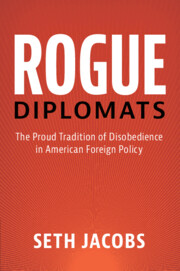Book contents
- Rogue Diplomats
- Cambridge Studies in US Foreign Relations
- Rogue Diplomats
- Copyright page
- Dedication
- Contents
- Acknowledgments
- Introduction
- 1 “It Is Glory to Have Broken Such Infamous Orders”
- 2 “Service without Authority”
- 3 “Instructions or No Instructions”
- 4 “I Have Now Read the Dispatch, But I Do Not Agree with It”
- 5 “No ‘Rubber Stamp’ Ambassador”
- 6 “We Can’t Fire Him”
- Conclusion
- Bibliography
- Index
3 - “Instructions or No Instructions”
Trist Makes Peace with Mexico
Published online by Cambridge University Press: 24 April 2020
- Rogue Diplomats
- Cambridge Studies in US Foreign Relations
- Rogue Diplomats
- Copyright page
- Dedication
- Contents
- Acknowledgments
- Introduction
- 1 “It Is Glory to Have Broken Such Infamous Orders”
- 2 “Service without Authority”
- 3 “Instructions or No Instructions”
- 4 “I Have Now Read the Dispatch, But I Do Not Agree with It”
- 5 “No ‘Rubber Stamp’ Ambassador”
- 6 “We Can’t Fire Him”
- Conclusion
- Bibliography
- Index
Summary
Chapter 3 addresses the most brazen instance of rogue diplomacy in the annals of U.S. statecraft: envoy Nicholas Trist's all but single-handed forging of the Treaty of Guadalupe Hidalgo after he had been fired - not once but twice - by President James K. Polk. Trist's epochal act of mutiny obtained all the territory Polk had initially authorized him to demand - California, New Mexico, and Texas as far south as the Rio Grande - and at half the envisioned price: $15 million as opposed to $30 million. It also, I contend, saved the United States from the ordeal of a long, debilitating, and expensive guerrilla war with Mexico that would have poisoned U.S.-Latin American relations for over a century. Although Trist was ultimately arrested for his defiance of the president and spent the rest of his life working dead-end jobs to provide for his children, he did more than any other individual to make Manifest Destiny a reality. Trist's triumph, I argue, was in great part a consequence of his personality, for which the term "rebellious" could have been invented. I dig deep into Trist's life and career(s), establishing a constant pattern of behavior: he could not defer to authority, no matter how essential submission was to worldly success. This character defect, which would seem fatal for a diplomat, ironically facilitated Trist's great work in the winter of 1847-48.
Keywords
- Type
- Chapter
- Information
- Rogue DiplomatsThe Proud Tradition of Disobedience in American Foreign Policy, pp. 122 - 196Publisher: Cambridge University PressPrint publication year: 2020



